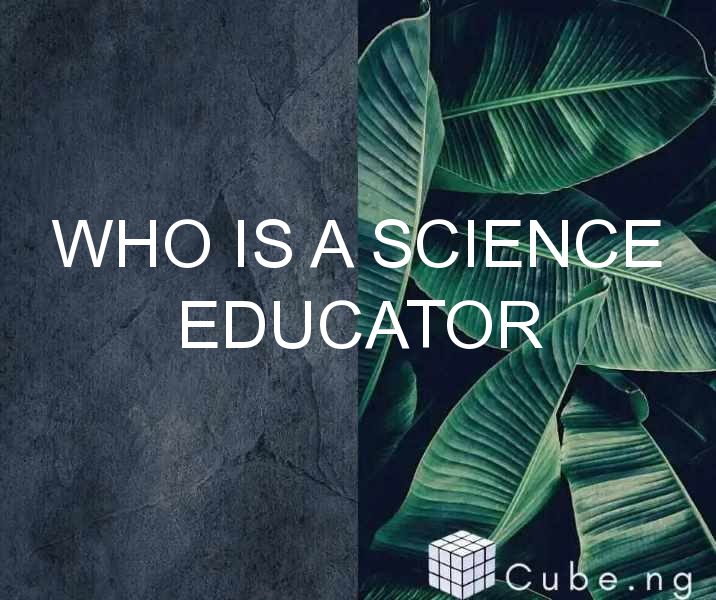Table of Contents
Who Is A Science Educator?
Science education is an essential component of the education system, and science educators play a crucial role in the development of future scientists, engineers, and researchers. But who is a science educator, and what does it take to become one? In this article, we will explore the meaning of science education, the qualifications required to become a science educator, and the role played by science educators in shaping the scientific mindset of future generations.
Defining Science Education
Science education refers to the process of teaching and learning science subjects, including physics, chemistry, biology, and earth science. The aim of science education is to develop critical thinking, problem-solving, and analytical skills in students, preparing them for careers in science, engineering, and research. Science education is not limited to classroom settings; it also encompasses informal learning environments such as science museums, science festivals, and science camps.
Qualifications Required to Become a Science Educator
Science educators come from diverse academic backgrounds, but they all share a passion for science and teaching. To become a science educator, one needs to have a thorough understanding of the science subject they will be teaching. Therefore, a bachelor's degree in a science-related field, such as physics, chemistry, biology, or geology, is a minimum requirement.
However, possessing a science degree alone might not be enough to become a science educator. Many science educators also have a teaching degree or certification, which equips them with the pedagogical skills required to teach science effectively. In some cases, science educators might be required to have a master's or doctoral degree in science education or a science-related field, especially if they are teaching at the college or university level.
The Role of Science Educators
Science educators play a vital role in fostering scientific literacy in students. They are responsible for designing and implementing science curricula, selecting appropriate teaching materials and resources, and assessing student learning outcomes. They also create a learning environment that fosters curiosity, critical thinking, and scientific inquiry.
Science educators also play a crucial role in addressing the gender and racial disparities that exist in science and technology fields. They work towards making science education more inclusive and accessible to students from diverse backgrounds, helping to bridge the STEM gender gap and promote diversity in science.
Types of Science Educators
There are various types of science educators, depending on the level and type of education they provide. Some of the common types of science educators include:
Elementary School Science Educator
Elementary school science educators teach science to students in grades K-5. They introduce young learners to the basics of science and help them develop a love for the subject. Elementary school science educators use hands-on learning activities, experiments, and demonstrations to engage students and make learning fun.
Middle School Science Educator
Middle school science educators teach science to students in grades 6-8. They build on the foundational knowledge students gained in elementary school and introduce more complex scientific concepts. Middle school science educators use inquiry-based learning strategies to encourage students to ask questions, investigate, and discover.
High School Science Educator
High school science educators teach science to students in grades 9-12. They prepare students for college-level science courses and careers in science, engineering, and research. High school science educators teach a range of science subjects, including physics, chemistry, biology, and earth science.
College and University Science Educator
College and university science educators teach science to undergraduate and graduate students. They conduct research in their chosen field of science and share their findings with their students. College and university science educators also supervise research projects and mentor students pursuing careers in science.
Science Museum Educator
Science museum educators work in science museums and other informal learning environments, designing and delivering science education programs for visitors of all ages. They use hands-on learning activities, exhibits, and demonstrations to engage visitors and make learning about science fun and accessible.
Skills Required to be a Science Educator
Being a science educator requires a unique set of skills that go beyond knowledge of the subject matter. Some of the critical skills required to be a science educator include:
Communication Skills
Science educators must be effective communicators who can explain complex scientific concepts in simple terms. They must be able to convey information clearly and concisely, both in writing and verbally.
Pedagogical Skills
Science educators must be skilled educators who understand how to design and implement effective science curricula. They must be able to assess student learning outcomes and adjust their teaching strategies accordingly.
Organizational Skills
Science educators must be organized and detail-oriented, especially when designing and implementing science curricula. They must be able to manage their time effectively and prioritize tasks to meet deadlines.
Interpersonal Skills
Science educators must be able to work well with others, including students, colleagues, and parents. They must be approachable and able to build trust and rapport with their students.
Final Thoughts
Science educators play a critical role in shaping the scientific mindset of future generations. They are responsible for fostering scientific literacy, promoting diversity in science, and preparing students for careers in science, engineering, and research. Becoming a science educator requires a combination of academic qualifications, pedagogical skills, and a passion for science and teaching. If you are considering a career in science education, remember that you will be joining a community of passionate educators who are dedicated to inspiring the next generation of scientists and engineers.




